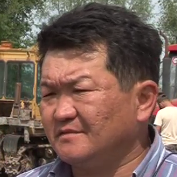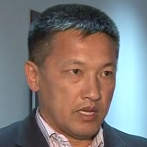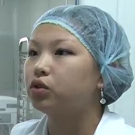Robert Kadyrkulov is the manager of a cooperative farm. The farm comprises eleven hundred hectares of corn, barley, sugar beet, and saffron fields in the village of Stavropolovka, about one hundred kilometers outside the capital. Using quality seeds, modern planting techniques, and high tech machines, this year he expects a 40 percent profit on the farm’s saffron crop alone. “If we had more farms like this, we could become self-sufficient and we can provide food for ourselves,” he says.
Through a World Bank-supported program, the cooperative farm used a combination of loans and grants to buy a modern, mechanized combine harvester for $115,000 US dollars. It is a new kind of farming – Kadyrkulov and his colleagues don’t stand in the field with a hoe… they get behind the wheels of giant machines. “The combine harvester was a boost for our farm because manual harvest is nearly impossible for corn. With the old Soviet machines we were only able to harvest corn on 20 hectares. Now we can do it on 100 hectares,” Kadyrkulov says.



